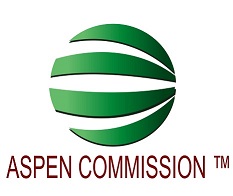ASPEN COMMISSION ™
THE CENTER FOR PHILOSOPHY POLITICS SPIRITUALITY AND SCIENCE ™
Education that is safe, relevant, and promotes social cohesion. We will also fund programs to ensure children are reading and gaining basic skills that are foundational to future learning and success; young people are learning the skills they need to lead productive lives, gain employment, and positively contribute to society; and higher education institutions are supporting development progress across sectors. We will remain champions of girls’ education and target the underlying causes of gender gaps in education attainment. Closing the gender gap in secondary education has a direct and robust association with economic development, as a 1 percent increase in female secondary education raises the average GDP by 0.3 percent, and raises annual GDP growth rates by 0.2 percent. The Department and USAID will foster inclusive economic growth in which all members of society share in the benefits of growth, reducing poverty, building resilience and expanding opportunity, and by reducing political turmoil and conflict. We will help developing and transitional countries improve their policies, laws, regulations, entrepreneurial skills and professional networks to boost private sector productivity, ensure equal opportunities for women and marginalized groups, and spur diversified and sustainable economic growth. We will support capacity building of private-sector entities that can link the poor to markets, including international ones, through effective and economically sustainable systems and relationships. Through implementing the U.S. Global Food Security Strategy, we will continue our global leadership to advance inclusive and sustainable agricultural-led economic growth, strengthen resilience among people and systems, and improve nutrition, especially among women and children, to enhance human potential, health, and productivity. We will strive to alleviate the burden of gender-based violence, which affects women’s ability to thrive and succeed. The Department and USAID will encourage improvements to corporate governance, sharing new technology, supporting capital formation and strong, abuse-resistant financial systems to bolster the business capacity of small business and high growth-potential entrepreneurs to help grow and integrate domestic and international markets. By strengthening property rights and land/ resource tenure, U.S. engagement will support women’s economic empowerment, youth employment, conflict prevention, and other development objectives. We will promote the use of U.S. pollution control technologies, combat environmental crimes and marine debris, and support innovative approaches to climate resilience. In furtherance of the U.S. Global Water Strategy’s goal of a more water secure world, the Department and USAID will also work to increase the availability and sustainable management of safe water and sanitation. We will foster transparency in environmental governance in partner countries, support the modernization of power grids, improve energy security, help partner countries make investments in their own development agenda, and improve their capability to track and report financial flows. We will foster the ability of countries and communities to take on the responsibility for building resilience and managing risks from shocks and stresses by helping countries more effectively harness their domestic resources as well as private sector capital. Cross Agency Collaboration In addition to engaging bilaterally and through multilateral fora, partner agencies include the Departments of Commerce (DOC), Treasury (DOT), Health and Human Services (HHS), Energy (DOE), Interior (DOI), the Centers for Disease Control (CDC), the Environmental Protection Agency (EPA), the Trade and Development Agency, and the Peace Corps. Risk The ability of the Department of State and USAID to advance economic development and growth in partner countries, and thereby advance American economic objectives, is affected by external risk factors, including the degree of partner country leadership and political will to enact major reforms; lack of domestic resources and investments; corruption and mismanagement; and increased incidence of conflict, crisis and natural disaster. Global economic security and development also face risks from the disruption caused by natural disasters. Economic losses from hazards such as storms, earthquakes, and pandemics are both drivers and symptoms of state fragility. Investments in improving governance, including building social trust, increasing accountability of policymaking, and improving capacity of administrations to deliver quality services to citizens of both sexes and all demographic groups, have been shown by experience to improve resilience in the face of major disruptions.
Corruption StrategyAdvance U.S. economic security by ensuring energy security, combating corruption, and promoting market-oriented economic and governance reforms.
|

World Markets
-- Teddy Roosevelt, 26th President of the United States of America
Aspen Commission ™ All Rights Reserved 1996-2025
IBS INTERNATIONAL BOARD OF STANDARDS
Aspen Commission Academy of International Relations, Philosphy Politics and Innovation - International Political Foregin Relations Public Policy Council. The Aspen Commission ™ is an Association Registered in Colorado and is also a listed as an Limited Company CO USA.
CEO Commission Join Mission Ethics Home Continuing Ed Government Jobs Awards Degrees Certification newspapers Diplomacy markets Links Careers Disclaimer
Accreditation and Recognition: GAFM * www.GAFM.org * www.CertifiedProjectManager.eu * www.AAFM.org * Certified Project Manager * Certified e-Commerce Consultant * Royal Law Society * Royal Business Society * Royal Business College * Royal Fellows * Royal Economics Academy * Oxford Law School * AAFM * Certified International Project Manager * www.GMentz.com * www.CertifiedProjectManager.org * www.GeorgeMentz.com * www.AAFM.us * www.icecc.com * www.reclaimingspirituality.com *